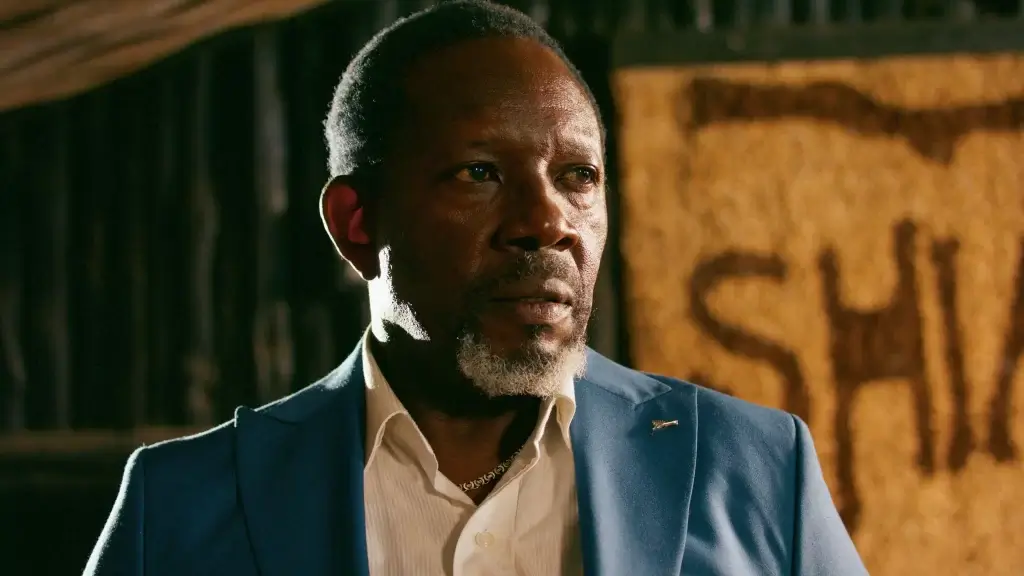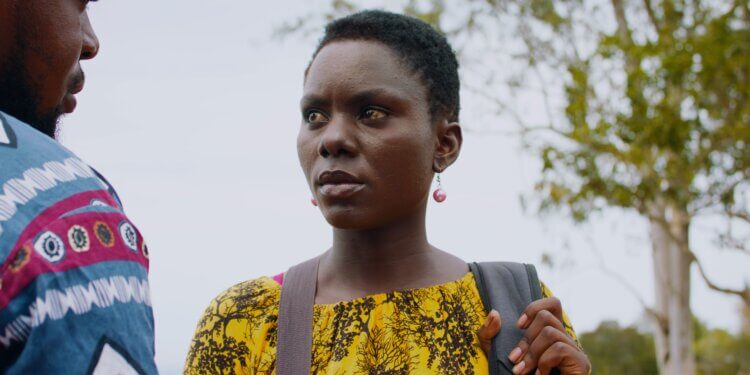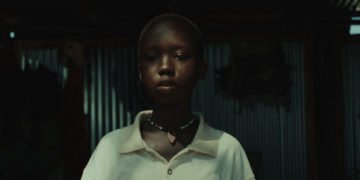The best Kenyan film to come out in the last ten years is set deep in a coastal forest where hopeful and disenfranchised youths looking to go abroad have their bodies taken apart for organs at auction. Marking Daudi Anguka’s feature directorial debut, Mvera is a triumph for Kenyan cinema and deservedly our country’s official submission to the 2024 Academy Awards. Against Shimoni, which seemed like our strongest Best International Feature contender before Mvera’s release, we couldn’t have selected a finer choice. Mvera is also the name of our protagonist, a young woman and a modern-day Mekatilili Wa Menza, who finds herself in a Hitchcockian situation after stealing her way to paradise, expecting to be sent away to New York with plans to reconnect with her mother, only to find her life and those of her friends in grave danger.
The film starts with a narration about the great Mekatilili, one of our earliest freedom fighters, before we switch it up and follow our Mekatilili (Mvera), who’s a little selfish, truth be told, in that she wasn’t chosen by the big ‘saviour’ company, Thabiti Foods Limited, to go abroad. So she steals her friend’s chance, leaving said friend acutely distraught. That friend is the lucky one by the time this film ends. Thabiti Foods Limited, of course, is just a front for an organ trafficking operation, and it isn’t long before the vibes are all sour.
Mekatilili Wa Menza was a well-known maverick of the nineteenth century who opposed British rule. From the English point-of-view, she was very stubborn in that she protected Giriama men from fighting for them in World War I, thus preserving the future. In this film, our protagonist, Mvera, is tasked with delivering the truth of these ‘foreign opportunities’ to her people and preventing these atrocities from ever happening again. Now, the film has fun pitting Mr. Thabiti against Mvera as they play cat and mouse in the third act, Mvera being quite slippery indeed and stubborn, just like her legendary namesake. The film is bookended by this leitmotif. The words that open the film are the same ones that close it. The juxtaposition—Mvera in the beginning, a selfish girl wanting nothing more than to escape her existence, being told of Mekatilili and her importance by her aunt, against Mvera at the end, after everything she goes through, crawling her way back to her people, to give them a little closure and the ugly truth—is breath-taking.
“Nilifikiria tunaabiria gari leo,” says one of the girls recruited in Thabiti Food’s travel abroad scam, to which the big bad of the film, the menacing millionaire, Mr. Thabiti, played by Patrick Owino, replies, “Ndege, sio matatu.” Mr. Thabiti is a fleshed-out monster. We are treated to flashbacks of his past, his troubled relationship with his mother, and how he got into the organ trafficking game, killing it (pun somewhat intended) for almost two decades. Owino is stellar in the role, completely and absolutely inhabiting Mr. Thabiti, at once both terrifying and remorseful. The scenes in which he appears with his hateful mother send shivers down one’s spine. For instance, when he forces her to witness the burning of bodies of organ trafficking victims. He had a rough childhood, and his mother is by no means innocent of it at all. He also has a foreign Lady Macbeth by his side, who he’s willing to whack in a moment’s turn to save his pride. The script employs game theory masterfully, characters within their respective intelligence levels surprising us naturally. I dare say that Mvera is undoubtedly the best Kenyan film to have come out in the past decade, but ah, I think it’s the best Kenyan film of all time, period.

For all its achievements, Mvera would not be Mvera without its titular character. One-time Kalasha nominee Linah Sande gives the single best female lead performance this country has ever witnessed on just her second film outing. Sande’s performance certainly warrants more from us. If the Academy of Motion Picture Arts and Sciences weren’t a political party, and Africa enjoyed the same push, prestige and recognition as the Oscar-favourite territories, she should be up there with Margot Robbie next year.
I reached out to Sande to find out how she and director Anguka were able to mould such a performance. She received the role in early 2020 and internalised various drafts of this script, though her character, Sande maintains, remained the same all through. Her performance has a zen-like control to it. She never gives you more than you need, and she certainly never gives you less. The result is a stamp of a character who cannot be separated from the story in which she appears. Crucial, because said story is also titled after her.
Watching Mvera, one would not be able to guess the difficulty Sande had speaking native Swahili. When we spoke, I was surprised, expecting to hear impeccable Swahili, only for her to speak in her real voice and in English. She researched all she could on Mekatilili and had a few advisors from the Mijikenda tribe on set with her. Such dedicated research is rare in this industry.
Mvera as a character doesn’t really grow, per se, but she becomes more compassionate, refusing to leave her injured friend behind, even after said friend urges her to do so for Pete’s sake. Even in the end, her biggest motivation for escaping and returning to her village is to save her own life, like in the beginning, when she steals her friend’s chance to help herself. Mvera’s lack of a character arc may have been a blessing because the character doesn’t need one. A thriller like this puts her in different dangerous situations, each revealing a new dimension to her we are already familiar with. For her, there’s no need for growth, only survival.
Mvera is also a bit of an ice queen who tells it straight when one woman leaves her infant child with her alcoholic deadbeat father. She’s the type of human being thin-skinned folk may identify as abrasive, and she’s only interested in what she’s going after. The only time her bud opens up is in some scenes with Owino’s Thabiti when he reassures her that her mother is in New York and that she will be joining her soon. For all her pursuits, she’s a character we never get to see content. This film exists solely for her to achieve her goals, and little does she know that happiness is not her purpose; being a hero is. This story really is a great tragedy because Mvera never finds contentment, but the film finds even more thrilling ways to deliver satisfaction.
The film’s score is another cherry on top. The music seems to have been written and performed expressly for this picture, and so it’s part and parcel with the characters’ actions, gestures and words on screen. It plays off the film, and the film is allowed to play off of it. We rarely see this in local films that this bare minimum flourish awed me extremely. I thought I never wanted to hear another piano key in any of our film’s scores until until I heard Mvera’s soundtrack and how it rhymes perfectly with the picture.
Regarding cinematography, Mvera was shot on digital with a beautiful dust-like grade that accentuates life in the coastal villages. Once they get to Mr. Thabiti’s resort, it’s as if the air has been cleaned out. One of my biggest qualms with local films and TV shows is tacky drone shots, used unimaginatively to separate scenes. In Mvera, sure, there are a few drone shots, but they’re employed with a certain level of creativity that elevates the story. For instance, to show the sheer number of graves that need to be dug up for the victims and of the fairly large private resort that houses this organ trafficking ring, hugged tightly by a grove of boisterous trees, which indicates to the viewer that escape would be futile—it’s dreadful every time it’s used.
Written by Voline Ogutu (who’s becoming one of Kenya’s finest screenwriters) and Kahindi Yaa, Mvera has a fluidity to it that feels fresh for Kenyan cinema. There have been films that have had integral structure before, but they have been few and far between. Like I said of the score, the film itself rhymes. Every line of dialogue, camera pan or tilt, has an emotional purpose for the audience. Set-ups are deliciously paid off just when you’d forgotten about them.
The script is elevated by the virtuosity of Anguka, whose direction delivers suspense of the ilk of a Brian De Palma. Even simple run-of-the-mill scenes, for example, one in which we wonder whether Mvera’s aunt will sell her out (“she obviously won’t, right?”), have you on the edge of your seat! The caretakers Mvera and company find at the resort take time to have any effect, but after a few scenes, they begin to feel like shady private investigators. You get the sense that everything is not as it seems, and the employees at the resort go a long way into getting that feeling. One in particular gives a stellar performance, bringing to mind Mrs. Danvers in Hitchcock’s Rebecca.
Mvera does not purport to speak on the evils of organ trafficking; it simply uses it as a hanging line to deliver a one-of-a-kind suspense thriller that works so well, only partly because it hits close to home. The only time it dwells on the moral conundrum of such activities is in service of the very genre itself; when it uses it to flesh out the antagonist, Mr. Thabiti, to the point you can see where he’s coming from. There are no sanctimonious speeches in this film, not one. If it’s a great work of art, that’s only because it’s a great work of entertainment.
Critic’s note: I see no need to justify my judgement of this film beyond telling everybody to go and see it when and where they can. I am actively waiting for it to be released for streaming so I can see it again and show it to some friends of mine. I will, however, make a broad statement about its leading lady. I called Jennifer Lawrence’s success in 2009, even before casting for The Hunger Games got out. I knew Iggy Azalea was untalented but would mesmerise the world in time back when she was a little underground artist. I didn’t know much then, but I’ve always had an instinct for these things.
Now I know a lot, and my instincts also tell me—no—are screaming at me that Linah Sande could be one of our biggest stars if we allow her to be in our faces more often. In a more established film industry, this rise to the top would be faster, instant even. She has that IT factor, and she’s supremely talented to boot. She’s got a number one fan in me.
Update: Mvera is now streaming on Netflix.
Enjoyed this article?
To receive the latest updates from Sinema Focus directly to your inbox, subscribe now.











